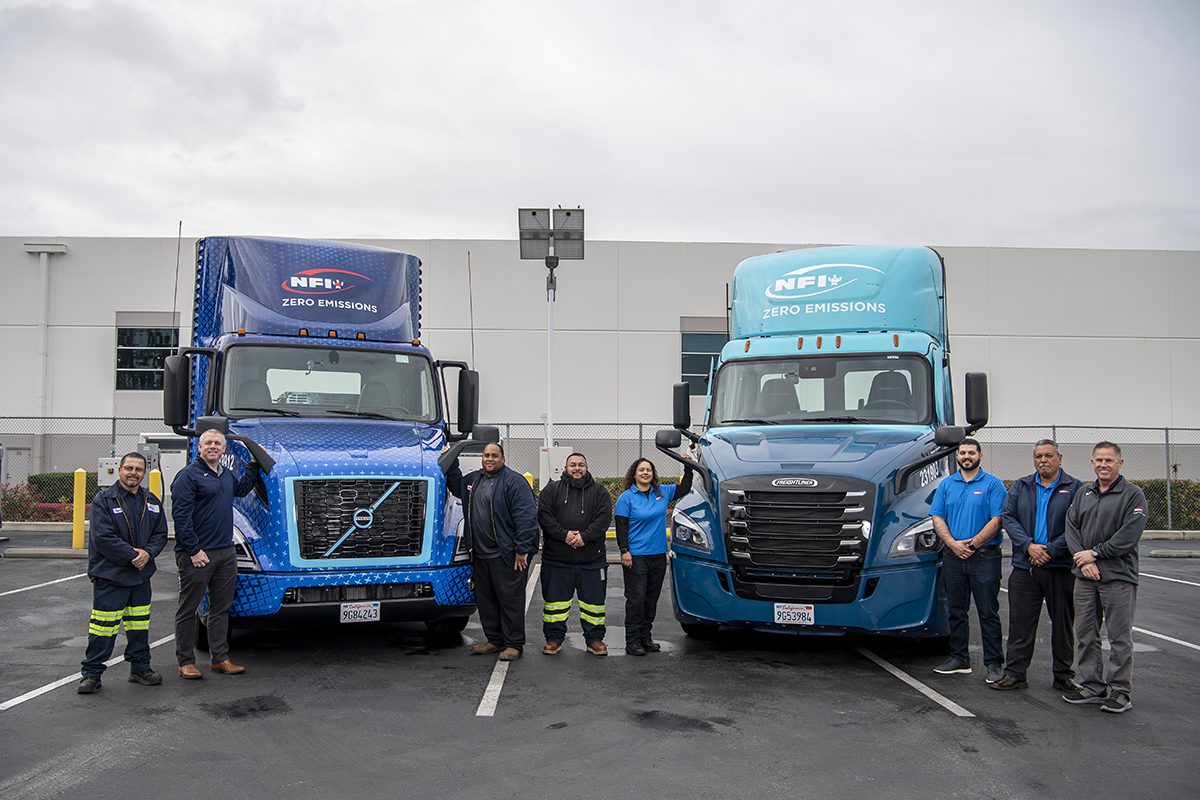Supply chain solutions provider NFI recently expanded its fleet of Class 8 battery-electric trucks (BETs) as part of the massive Joint Electric Truck Scaling Initiative (JETSI) project. The project, which is designed to show that fleets can successfully scale their BET fleets, will expand NFI’s fleet pf zero-emission trucks with 30 electric Freightliner eCascadias and 20 Volvo VNR Electric trucks in total at its Ontario, California, warehouse facility to support its dedicated port drayage services.
NFI has taken delivery of the first 15 of its Class 8 BETs funded through the project, with the remaining ordered trucks set to be delivered by the end of June 2023.
“NFI has worked closely with its OEM partners — Volvo Trucks and Daimler Truck — during the last several years to put battery-electric trucks to the test on our routes across Southern California,” said Sid Brown, CEO, NFI. “Through the JETSI project and other innovative fleet electrification efforts, we are excited to apply our early learnings and both lead the industry and accelerate progress toward achieving our sustainability goals. By the end of this year, we will have 100 Class 8 battery-electric trucks dedicated to port drayage, bringing cleaner air to the communities in which we operate.”
During its 90-year history, NFI has served customers around the world and amassed a company-owned fleet of more than 5,000 tractors and 14,300 trailers. As part of the company’s commitment to drive supply chain sustainability, NFI has taken a leadership role in the electrification of freight movement and has participated in several BET demonstration projects since 2018, including the Volvo LIGHTS, Daimler Truck’s Innovation Fleet, and Switch-On projects. Through these projects, NFI’s demonstration fleet of Freightliner eCascadias, Volvo VNR Electrics, and electric yard tractors has traveled more than 1.5 million miles to date and offset more than 2,300 metric tons of greenhouse gas emissions — equivalent to eliminating 225,933 gallons of diesel fuel consumption.
“The team at NFI has been incredible to collaborate with the past several years, working hand-in-hand with Volvo Trucks’ engineering team and local dealer partner, TEC Equipment, to validate and configure our commercial Volvo VNR Electric model to successfully run NFI’s drayage routes,” said Peter Voorhoeve, president, Volvo Trucks North America. “This partnership will now continue through the JETSI project as our organizations closely collaborate with NFI to scale its BET fleet, maximize vehicle uptime, and showcase the real opportunity to transport goods with zero-tailpipe emissions.”
NFI has gained valuable insight into which routes are optimal for BETs from its participation in multiple freight electrification projects. In addition, NFI has collaborated with Volvo Trucks North America and Daimler Truck North America to configure its trucks based on its operational needs, as well as train its drivers on how to extend power in the battery and how to maximize regenerative braking benefits.
“By working with the NFI team as part of Daimler Truck’s Innovation Fleet, our team has gained incredible insight into the necessary steps needed to successfully deploy battery-electric trucks into freight movement operations,” said David Carson, senior vice president, sales and marketing, Daimler Truck North America. “Beyond collaborating with NFI to ensure the Freightliner eCascadia technology was ready for real-world operations, we’ve been able to see firsthand the processes and stakeholders required to install the charging infrastructure to support the trucks. This knowledge enabled us to provide guidance to many customers looking to electrify their fleet operations.”
To install the charging infrastructure needed to support its growing BET fleet, NFI is working closely with Southern California Edison, Electrify Commercial, and the City of Ontario to upgrade the facility’s power supply and install 19 350kW power cabinets, which have 38 electric vehicle charger dispensers. NFI’s Ontario charging infrastructure is anticipated to be installed and energized by the end of 2023. In the meantime, NFI will temporarily operate its BETs from its Chino facility, which contains high-powered charging infrastructure from earlier projects.
Funding for 50 of NFI’s BETs and supporting charging infrastructure came from JETSI, a joint project of the South Coast Air Quality Management District (South Coast AQMD), California Air Resources Board (CARB) and the California Energy Commission (CEC).
To learn more about NFI’s fleet sustainability initiatives, visit www.nfiindustries.com/about-nfi/sustainability.


